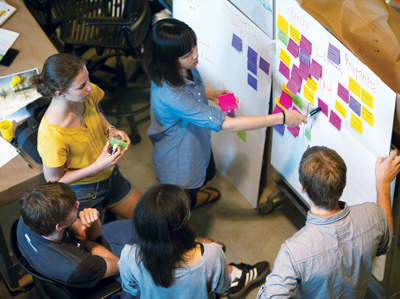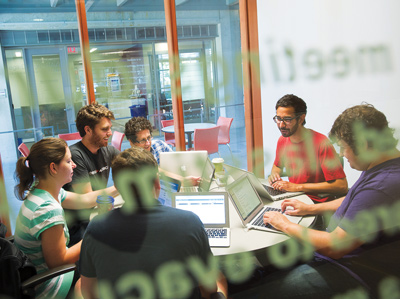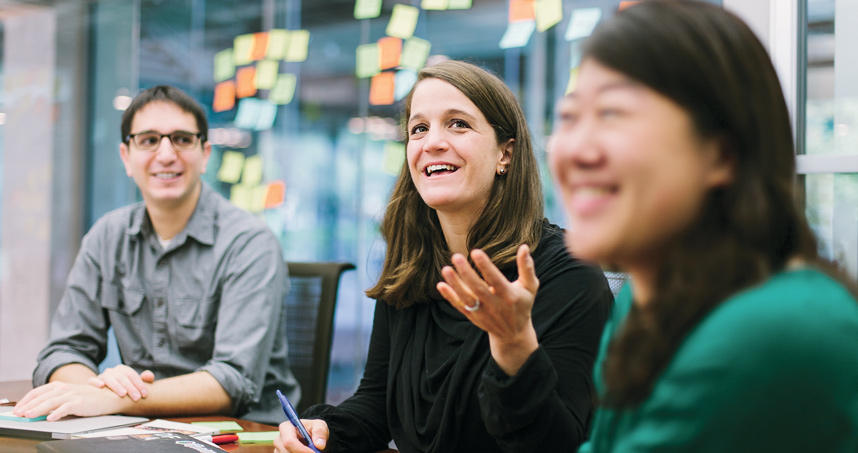Advancing Collective Innovation
Northwestern Engineering's Liz Gerber uses her experience in product design to build new tools to help people innovate better together
Working as a designer at a toy company in San Francisco 16 years ago, Liz Gerber was confronted with an intriguing challenge: implement an outreach program to foster children’s interest in design.
Her team’s response, the Kid Inventor Challenge, invited children from around the country to take their best shot at designing their ideal toy. Entrants submitted their drawings to Gerber and her team, who then posted them online for other kids to comment on and vote for the best ideas.
Most amazing to Gerber was not the design ideas. Rather, it was how the online platform empowered the kids to collaborate with peers who shared their passion for design as well as the rate at which new ideas were developed and expanded within the company.
For Gerber, the contest showcased how a large number of people in disparate locations could work together effectively in a coor- dinated, meaningful way. She reasoned that if hundreds of children could use technology to achieve a greater level of collaboration and innovation in the toy industry, what might result if such platforms were used in fields like healthcare, technology, and education?
COLLECTIVE INNOVATION AT WORK
Gerber, now associate professor of mechanical engineering, leverages her toy designer experience as she explores the social and technological principles behind how people innovate across industries. At Northwestern, she’s developing the theory and end-user technology that promote what she calls collective innovation: innovation that harnesses the diverse and untapped human, social, and economic capital from distributed networks that together can discover and implement new ideas.
“People used to think of a designer or entrepreneur as someone who sat alone and came up with an idea,” Gerber says. “With the Internet, that single person can now engage with hundreds or even thousands of other people to advance an idea or develop a product.”

As a member and co-founder of Northwestern’s Delta Lab, an interdisciplinary research lab whose members major in engineering, physics, psychology, anthropology, economics, and computer science, Gerber is building tools to support the burgeoning field of crowdfunding—a contemporary example of collective innovation— in which a large number of people contribute funds to help launch a startup enterprise.
Guiding the lab’s work, Gerber applies certain principles to maximize the impact of this form of collective innovation. Specifically, crowdfunding must:
- Remain inclusive to novices and underrepresented individuals
- Provide transparent goals and intentions
- Support resource exchange of all kinds (information, money, time)
- Strive to connect communities instead of simply raising funds.
TOOLS OF INNOVATION
Critiki, one of the first collective innovation tools the lab developed, provides users a way to gather feedback on one of the most important and influential components of any crowdfunding effort: the pitch video. Created by PhD student Michael Greenberg, Critiki helps novice crowdfunders gain substantive feedback on both the pitch video’s technical structure as well as its content.
“Pitch videos have evolved in just a few years from recording an amateur home video to hiring a production company to give the pitch a professional polish,” Gerber says. “Even then, crowdfunders often don’t receive constructive feedback on the effectiveness of their videos before their campaign goes live. Critiki offers the opportunity for feedback from experienced peers so campaign organizers can make improvements before launch.”
Another project in development by PhD students Julie Hui and Yongsung Kim seeks to tap the collective intelligence of experienced crowdfunders to offer a comprehensive education resource for first-timers. Dubbed Cyber Incubator, Gerber believes the platform will help novices better understand the behind-the-scenes planning and networking required to launch a successful campaign.
“Users will be able to review their fundraising and manufacturing plans and goals by comparing data we’ve collected from expe-rienced crowdfunders,” she says. “If someone wants to raise $50,000 for a startup business, they will be able to learn how similar campaigns were planned, including elements like how big of a donor network organizers needed to target or how reward levels should be structured.”
A FIELD IN PERPETUAL FLUX
Many scientists examine data only after its variables have become stable. Gerber’s research, on the other hand, relies on continually evolving technology that yields little regularity. She estimates as many as 800 crowdfunding outlets can be found online today catering to dozens of niche efforts, from helping authors raise funds to publish a new book to assisting researchers involved in scientific study.
 As the available means for practicing collective innovation continue to grow, so too do expectations for performance. Gerber points to the “professionalization” of crowdfunding, which has resulted in lower acceptance rates from platforms like Kickstarter. She also notes a greater desire for transparency from potential donors.
As the available means for practicing collective innovation continue to grow, so too do expectations for performance. Gerber points to the “professionalization” of crowdfunding, which has resulted in lower acceptance rates from platforms like Kickstarter. She also notes a greater desire for transparency from potential donors.
“People are less naïve toward crowdfunding as they’ve witnessed the field taking shape over the past few years,” Gerber says. “Donors now expect greater transparency from organizers about what their goals are, how they plan to achieve them, and how they will deal with the inevitable hiccups along the way.”
While Gerber acknowledges the importance of qualifying her research to reflect the technological and social changes she sees, she maintains that her guiding theory on collective innovation has remained consistent and applicable. She cites as evidence the outreach she receives from current crowdfunders.
“Crowdfunders and platform designers contact us every week asking for advice or to stay in the loop of what we are working on,” Gerber says. “To study something so culturally relevant and pervasive is very powerful. To me, it’s the most exciting place to be as a researcher.”

